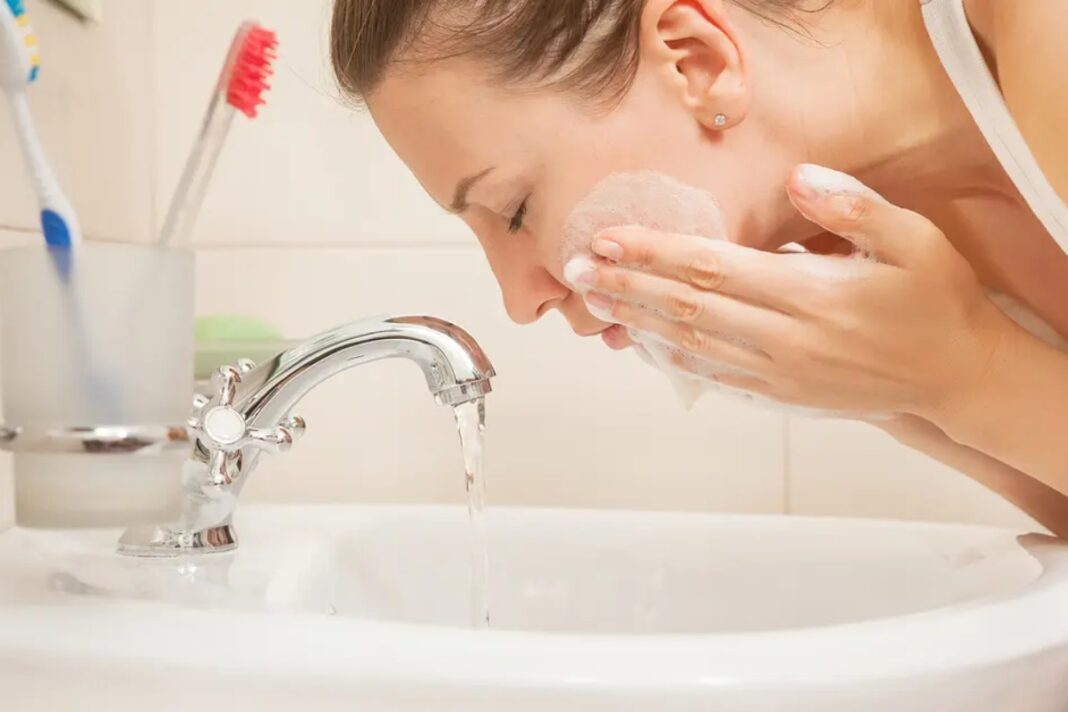Every morning begins with a splash of confidence, yet experts now question if that splash is truly kind. Washing your face with tap water feels refreshing, but hiding beneath the bubbles may lie in surprising trouble.
Chlorine, minerals, and changing water quality are quietly rewriting skincare truths. So, before the next rinse, it’s time to ask, what really flows from your tap and how does it touch your skin?
What’s in Your Tap Water? The Hidden Ingredients
Every glass and splash from your faucet carries a story. Tap water often contains minerals like calcium and magnesium, along with chlorine and fluoride used for disinfection. These elements vary from place to place, affecting each skin type differently. In cities, where water is often “hard,” its high mineral content can leave residue that dries the skin.
Dermatologist Gulhima Arora explains that chlorine and calcium can irritate the skin surface, leading to dryness and sensitivity. The water’s pH level can also disrupt the skin’s natural balance, increasing the risk of irritation.
Expert Opinion: What Dermatologists Recommend
Dermatologists say washing your face with tap water daily may not suit everyone. They emphasize understanding your water quality before deciding on your routine. Dr. Gulhima Arora notes that consistent use of unfiltered water can worsen dryness and irritation. She advises adopting small, effective steps to safeguard your skin barrier. Solutions you can try:
- Use a micellar water or toner to remove leftover residue after cleansing.
- Install a water filter to reduce chlorine and mineral levels that trigger tap water and skin irritation.
- Moisturize immediately after cleansing to retain hydration and strengthen skin defense.
- Opt for pH-balanced cleansers instead of harsh surfactants for smoother, balanced skin.
These dermatologists’ advice on tap water methods helps preserve your skin’s freshness without depriving it of daily cleansing comfort.
How Tap Water Affects Your Skin Barrier?
Your skin barrier works as a shield, maintaining an ideal pH near 5.5. Tap water often ranges from neutral to alkaline, disrupting that delicate balance. Over time, this imbalance may cause dryness, acne flare-ups, or dullness.
Mineral deposits build up, blocking pores and reducing hydration. For sensitive or acne-prone skin, even mild exposure can worsen redness and patchy irritation. Washing your face with tap water too frequently can quietly chip away at this natural defense layer.
What You Can Do Instead?
Dermatologists suggest a few practical skin care tips for reducing tap water and skin irritation effects. Use lukewarm water instead of hot, cleanse only twice daily, and always follow with toner or moisturizer. Home filters lower chlorine and calcium levels, creating skin-friendly water.
Choose hydrating cleansers rich in humectants and avoid harsh scrubs. If redness or itching continues, seek medical advice for a customized skincare plan. These dermatologists’ advice on tap water practices builds a barrier toward better, calmer skin.
A splash may seem harmless, but knowing what’s behind it transforms your skincare. Small changes protect more than you realize.
Disclaimer: This content, including advice, provides general information only. It is not a substitute for a qualified medical opinion in any way. The methods and claims mentioned in this article should be considered as suggestions only; DNP India neither confirms nor denies them. Always consult a doctor before following any such suggestions/treatments/medications/diets.



